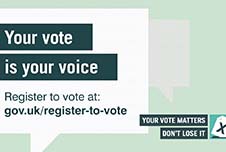
Look out for our canvassers!
Canvassers are to start knocking on doors in the St Albans District to encourage residents to register to vote.
Over the next few weeks, they will approach around 13,000 households which have not returned a household enquiry form.
The form was sent to all homes in the District in July with some 47,000 having been returned.
They are sent out every year by St Albans City and District Council to keep the electoral register up to date. They need to be completed even if there are no changes.
Now a team of electoral canvassers from the Council is visiting the households that have not completed the form.
Residents will be made aware that they need to respond to ensure they can vote at elections including next May’s District and Parish Council elections.
If your name is not on the register, you will not be entitled to vote.
The door-to-door canvass will go on until every property that has not completed an enquiry form is visited.
Everyone who is currently registered to vote at a particular address is listed on the household form. Residents need to check that the information it contains is correct.
If no changes are required, they must confirm this online at www.householdresponse.com/stalbans.
Alternatively, people can do this by free phone or text with full details of these procedures included in the form.
If the form needs to be amended, this can also be done on the website or by post.
Mike Lovelady, Electoral Registration Officer for the District, said:
Canvassers will call at every property where there has been no response to encourage people to make sure they do not lose their vote.
If you haven’t responded to the household enquiry form, please do so as soon as possible.
Just check the information on your form and either confirm it is correct or advise us of any changes. Instructions on how to do this are on the form.
Anyone not registered to vote can do so online at www.gov.uk/register-to-vote. It only takes a few minutes.
People who are added to household enquiry forms will be sent letters inviting them to do so.
Residents who have questions can contact the elections’ team by email at elections@stalbans.gov.uk or by telephoning 01727 819294.
More information is available on the Council’s website at: https://www.stalbans.gov.uk/voting-and-elections
John McJannet, Principal Communications Officer, St Albans City and District Council.
Tel: 01727-296130, E-mail: john.mcjannet@stalbans.gov.uk
Notes:
1. St Albans City and District Council elections are taking place in May 2019 with around one third of the seats to be contested
2. The electoral register lists the names and addresses of everyone who is registered to vote in public elections. The register is used for electoral purposes, such as making sure only eligible people can vote. It is also used for other limited purposes specified in law, such as: detecting crime (e.g. fraud), calling people for jury service or checking credit applications.
3. The open register is an extract of the electoral register, but is not used for elections. It can be bought by any person, company or organisation. For example, it is used by businesses and charities to confirm name and address details. Your name and address will be included in the open register unless you ask for them to be removed. Removing your details from the open register does not affect your right to vote.
4. To be eligible to register to vote a person must be:
- Aged 16 or over (a person may register to vote at 16, but may not vote until they are 18)
- A British or qualifying Commonwealth citizen who has leave to enter and remain in the UK or does not require such leave.
- A citizen of the Republic of Ireland or other European Union (EU) member state.
5. British citizens, Irish citizens and qualifying citizens of Commonwealth countries (including Cyprus and Malta), as well as citizens of other EU member states can vote in local government elections and Police and Crime Commissioner elections in England and Wales.
